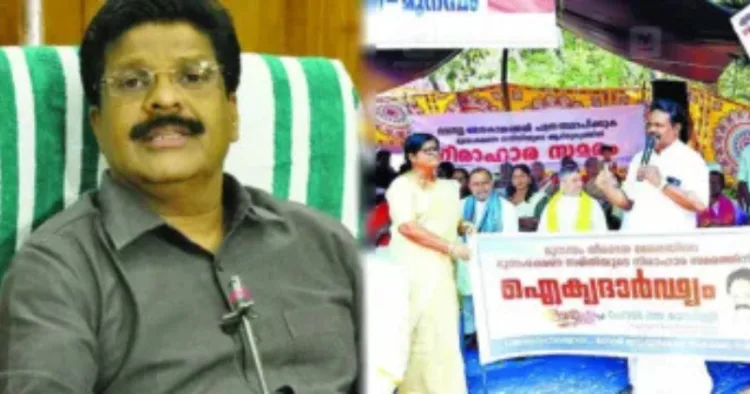Kerala Waqf Board chairman M.K. Sakeer stated that the land in Munambam belongs to the Waqf Board, and the Board has to protect it. He added that there is a central law governing Waqf Board activities. According to Sakeer, the issue dates back to 1962 when the land was awarded to an institution by an individual, thus rendering it Waqf property. He further remarked that the Waqf Board has not caused any anxieties in Munambam and is unaware if any external force has interfered.
Sakeer asserted that the Muslim community does not encroach upon Christian properties in Munambam, implying that any concerns raised are merely attempts to stir up a communal divide. His statement seems designed to dismiss Christian grievances outright, signalling that the Waqf Board has no intention of reconsidering its stance, regardless of the impact on the local Christian community.
Meanwhile, Kothamangalam Diocese Bishop Mar George Matathilkkandathil, Vijayapuram Diocese Bishop Mar Sebastian, and Auxiliary Bishop Mar Justine visited the pandal to show solidarity with the hunger strikers. Bishop Matathilkkandathil stated that the situation in Munambam represents a united campaign for survival, not directed against anyone. The protest affects everyone in the area. He asserted that Munambam residents do not live on Waqf properties and that there is clear and concrete evidence to support this, which even the Waqf Board is aware of. However, the Waqf Board still claims these properties, which he called blatant injustice. The people of Munambam are protesting against this injustice, and elected representatives should support them; yet, the opposite seems to be happening. The Bishop urged the people to consider what actions they should take against such representatives. He called on the government to stand by its citizens, noting that, in Munambam, this support is conspicuously absent. He encouraged the protesters to continue their struggle until they achieve victory.
Leaders and members of the Bharatiya Abhibhashaka Parishad, the Kerala chapter of Akhil Bharatiya Adhivaktha Parishad, also visited the pandal at Munambam, expressing their solidarity with those affected by the Waqf Board’s actions.
As the Munambam issue intensifies within state political circles and concerns escalate over the Waqf Board’s actions and developments, the Malayalam daily Janmabhumi published a report calling Waqf Boards across India control an estimated 8.7 lakh acres out of a total 9.4 lakh acres, valued at approximately ₹1.2 lakh crore. With this vast property portfolio, Waqf Boards emerge as the third-largest landholders in India after the Railways and the Defence Ministry. The country’s 32 Waqf Boards are governed by around 200 individuals, and these Boards currently face 40,951 legal cases involving alleged illegal land grabs. Interestingly, Janmabhumi highlights that the majority of these land encroachments involve Muslim occupants.
The Janmabhumi report reveals a comprehensive, state-wise account of Waqf’s extensive land claims across India. In Delhi, Waqf stakes claim to 108 properties managed by the Land Development Office and an additional 138 under the Delhi Development Authority. Uttar Pradesh sees Waqf asserting ownership over the ancient Sivalyala temple in Lucknow, while in Gujarat, the entire Surat Municipality has been targeted. In Maharashtra, 40 acres belonging to the Kaneefnath temple in Ahmednagar are in dispute. Karnataka has 1500 acres of traditional agricultural land in Honwada village, Vijayapura district, marked by Waqf. Kerala’s Cherai-Munambam area faces claims over 400 acres, affecting 610 families, including the Velankanni Matha Parish Church in Munambam. In Bihar’s Govindpur village near Patna, where Hindus form 95% of the population, residents have received eviction notices with a 30-day deadline. In Madhya Pradesh, Waqf has laid claim to 47 government buildings. Telangana faces disputes over 300 acres within Hyderabad city limits. Lastly, in Tamil Nadu’s Tiruchenthurai, Trichy, Waqf claims include 389 acres of agricultural land and a 1,500-year-old Chola temple, marking an assertive stance over culturally significant and prime lands nationwide.
The Janmabhumi report squarely attributes the rise of Waqf’s unchecked authority to the Congress Party’s longstanding policy of appeasement. This policy, the report claims, granted Waqf Boards extraordinary powers to appropriate public and private land under the guise of religious rights. Per existing rules, once Waqf claims a property, the burden falls on the property’s actual owner to prove otherwise, or risk losing it permanently. Given that Waqf land is considered a gift to Allah, the law offers no recourse for reclaiming it.
Key amendments to the Waqf Act, made during the regimes of Narasimha Rao in 1995 and Manmohan Singh in 2013, further fortified Waqf’s powers. The 1995 amendment’s 40th clause granted Waqf Boards authority to unilaterally declare any land as Waqf property. In 2013, an additional change broadened the rule, allowing Waqf to claim lands gifted by any individual, regardless of religious background, widening their scope for acquisition.
In a controversial move shortly before the 2014 Lok Sabha elections, the Congress government reportedly transferred 123 prime properties near Parliament to the Delhi Waqf Board – a decision which, according to Janmabhumi, epitomizes Congress’s indulgence in vote-bank politics.
The spread of information about the Waqf issue, alongside the heated debates and ongoing protests in Munambam, reflects significant shifts in the political and social atmosphere.



















Comments